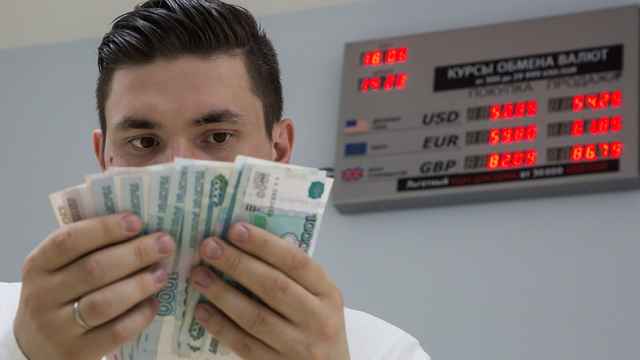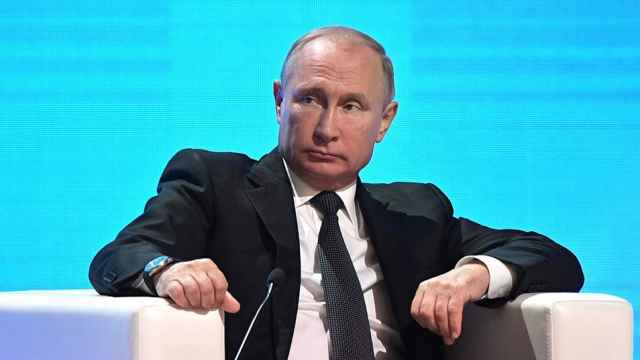Foreign investors’ holdings of Russian government debt fell below 20% for the first time in six years at the end of March, official data from Russia’s National Settlement Depository shows.
International investors have been selling their holdings in Russia’s state debt since the start of the year, fearful of being caught up in a possible hardening of sanctions against Russia in retaliation for the poisoning and jailing of Kremlin critic Alexei Navalny.
The outflow among foreign residents of holdings in so-called OFZs — Russian government bonds — hit more than 120 billion rubles ($1.6 billion) during March. That was the biggest monthly sell-off since April 2020 and took the overall share of foreign holdings down to 19.7%, according to analysts at state-controlled Sberbank’s investment banking arm.
“The outflows are being driven, in our view, by worries associated with rising benchmark yields, increasing geopolitical risks, a weakening ruble and continuing high placements,” said Sberbank analyst Alisa Zakirova on Tuesday in a research note.
End-of-quarter outflows likely also played a role, VTB Capital strategist Maxim Korovin said, with much of the March sell-off coming in the final days. Analysts suspect many investment houses have downgraded their positions in Russia’s foreign debt to “underweight” — a sign of market pessimism as traders limit their exposure to assets they consider too risky or not offering enough value.
At the start of the pandemic, foreigners owned more than a third of Russia’s government debt.
The Russian government rapidly accelerated borrowing last year to help pay for the costs of the coronavirus and fill the budget hole created by lower oil export revenues. State-controlled banks swept in to buy up the government debt in large numbers — which also pushed the share of foreign holdings down.
Despite their falling share, overseas investors’ holdings have remained relatively flat over the last 12 months in ruble terms, the Institute of International Finance (IIF) said, calculating total holdings at around $43 billion. Foreign holdings have actually tripled in value since 2014, when the international community first slapped sanctions on Russia for the annexation of Crimea.
But investors now fear the U.S. could go for the “nuclear option” of sanctions — an outright ban on U.S.-based financial institutions holding and trading Russian government debt.
Under various legislations against the use of chemical weapons, which could be wielded in response to the poison attack on Navalny, the U.S. administration has that option. It is a move Washington has been reluctant to consider, but calls from hardline senators for the Biden administration to adopt a tougher stance against Russia in response to the jailing of Navalny have grown louder since the start of the year.
Nevertheless, analysts are unconvinced as to how damaging that step would be for the Russian economy and the government’s ability to raise debt.
“The Central Bank has room to provide liquidity to banks to buy OFZs or the national welfare fund could be used to buy government bonds directly and at a significant discount,” Elina Ribakov, IIF deputy chief economist noted.
The scale of Russia’s international reserves provides ample opportunity to recover from even a complete sell-off among international holders of government debt, experts say, with Russia’s national welfare fund — a war chest built up from oil profits in the years before the pandemic — above $180 billion. Moreover, a financial system which is dominated by state-controlled lenders also provides plenty of potential willing domestic buyers.
“A total ban on transactions involving Russian foreign debt ... will only result in serious losses for Western financial institutions following the sell-out,” economist Vladislav Inozemtsev said recently.
“The Russian authorities will restructure their liabilities — making considerable savings on debt servicing. Therefore, by dealing a blow against Russian sovereign debt Western politicians will not inflict much damage to Russia’s finances.”
A Message from The Moscow Times:
Dear readers,
We are facing unprecedented challenges. Russia's Prosecutor General's Office has designated The Moscow Times as an "undesirable" organization, criminalizing our work and putting our staff at risk of prosecution. This follows our earlier unjust labeling as a "foreign agent."
These actions are direct attempts to silence independent journalism in Russia. The authorities claim our work "discredits the decisions of the Russian leadership." We see things differently: we strive to provide accurate, unbiased reporting on Russia.
We, the journalists of The Moscow Times, refuse to be silenced. But to continue our work, we need your help.
Your support, no matter how small, makes a world of difference. If you can, please support us monthly starting from just $2. It's quick to set up, and every contribution makes a significant impact.
By supporting The Moscow Times, you're defending open, independent journalism in the face of repression. Thank you for standing with us.
Remind me later.







